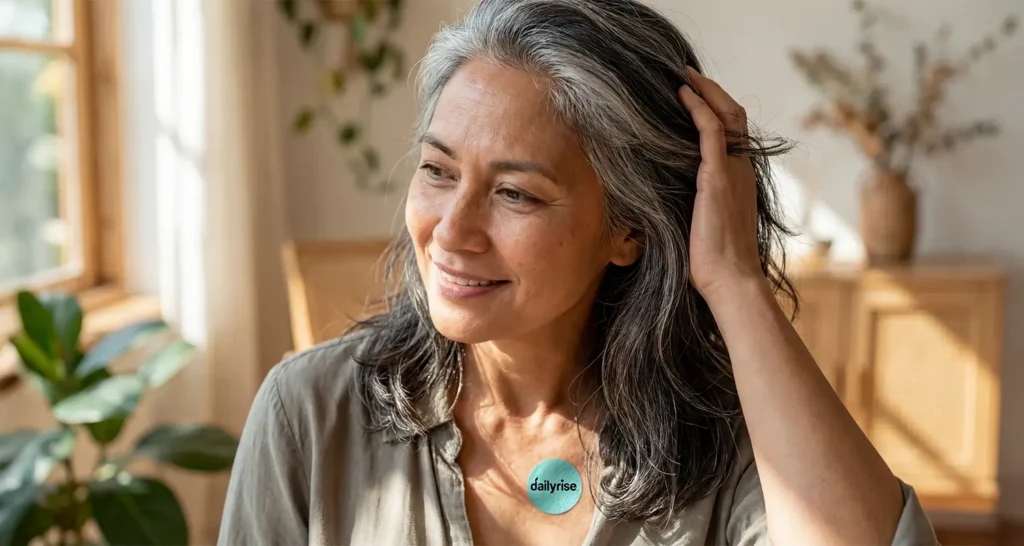
- Natural process: Greying happens when melanin production slows down, and genetics plays the biggest role in when it starts.
- Limited evidence: There is no clinical evidence that NMN or resveratrol reverses grey hair in humans — current claims are largely speculative.
- General hair health: Nutrient deficiencies (like B12, iron, copper, or zinc) may contribute to changes in pigmentation, so it’s worth correcting any shortfalls.
- Lifestyle matters: Smoking, unmanaged stress, and poor diet can impact hair quality overall, so basics still matter.
- Consult a professional: If greying is unusually early or happens rapidly, speak with a healthcare professional to rule out underlying issues.
Does NMN Reverse Grey Hair?
Grey hairs can be an unwelcome surprise when you look in the mirror. If you’re researching supplements, you may have heard whispers that nicotinamide mononucleotide (NMN) might undo grey strands. But is there any truth to these claims? This comprehensive guide explores whether NMN can reverse grey hair, what science says about graying, and what natural options may help you age gracefully.
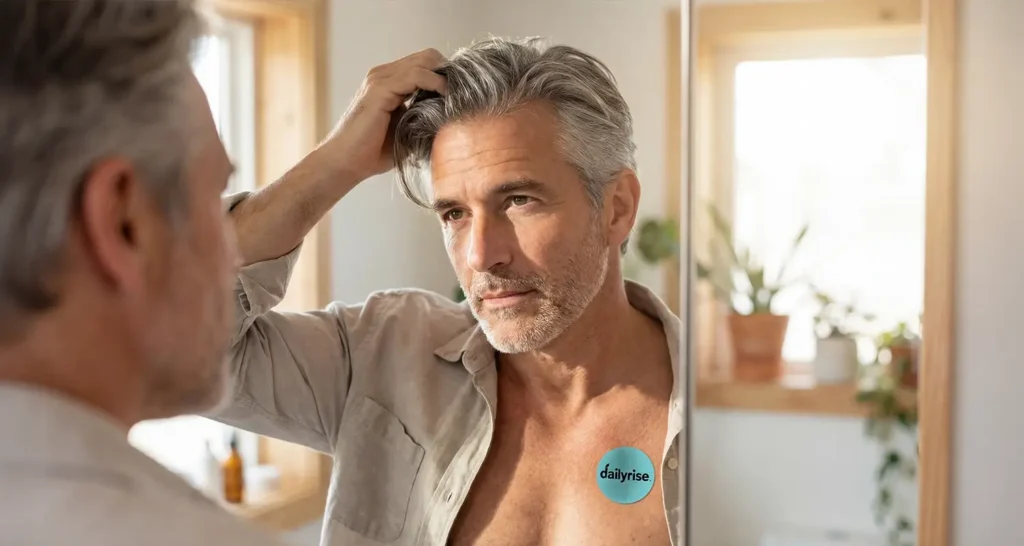
What Causes Grey Hair?
Hair gets its colour from melanin, a pigment produced by specialised cells called melanocytes. As we age, melanocytes gradually stop producing melanin, causing hair to lose its colour and turn grey or white. This is a normal part of ageing; half of all people will have 50% grey hair by age 50. Grey hair is primarily determined by genetics and is not considered a medical problem.
Can Nutrient Deficiencies Cause Premature Greying?
While genetics and ageing are the main causes of grey hair, deficiencies in nutrients such as vitamin B12, iron, copper and zinc can contribute to reversible hypopigmentation. NHS guidance notes that vitamin B12 deficiency is relatively common in older adults and can cause anaemia and neurological symptoms; GPnotebook lists pernicious anaemia and underactive thyroid among conditions linked to premature greying. Correcting such deficiencies may improve overall hair health but rarely restores significant colour to established grey strands.
Smoking and Oxidative Stress
Smoking is associated with premature greying because it increases oxidative stress, damaging melanocytes. Oxidative stress also results from everyday exposures (sunlight, pollution) and internal metabolism. Keeping oxidative stress low through a healthy diet and lifestyle may support hair follicles but will not necessarily re‑pigment grey hairs.

Where Does NMN Fit In?
NMN (β‑nicotinamide mononucleotide) is a naturally occurring molecule that the body uses to make NAD+, a co‑enzyme critical for cellular energy and repair. NAD+ levels decline with age, and boosting NAD+ with precursors such as NMN has gained popularity as an anti‑ageing strategy. Research in mice has shown that NMN supplementation can promote hair growth and thickness by reducing oxidative stress and increasing growth factors. However, this study focused on hair regrowth in a DHT‑induced hair-loss model; it did not evaluate grey hair re‑pigmentation.
What Do Human Studies on NMN Show?
Human trials of NMN are still in early stages. A review of clinical studies (2020‑2024) found that daily doses of 100‑1250 mg increased NAD+ levels and were well tolerated, but the benefits observed in animal models are much smaller in humans. There is no clinical evidence that NMN supplementation reverses grey hair or stimulates melanin production in human hair follicles. Claims that it does are speculative and not supported by peer‑reviewed research.
NMN and Melanin Production
Melanin synthesis occurs in specialised hair follicle cells and depends on enzymes such as tyrosinase. There is currently no data showing that NMN directly influences melanocyte function or melanin synthesis. While NAD+ plays a role in cellular metabolism, increasing NAD+ does not necessarily increase melanin production.

Other Supplements Claimed to Reverse Greying
Many products marketed for reversing grey hair contain ingredients like catalase, copper, tyrosine or PABA. Scientific support for these is weak. For example, catalase is an enzyme that breaks down hydrogen peroxide; some websites claim greying results from hydrogen peroxide accumulation in hair follicles. While this theory has been explored, there is no strong evidence that taking catalase supplements restores colour. Copper and zinc are involved in melanin synthesis, but normal dietary intake usually meets requirements.
Can Resveratrol Help Your Hair?
Resveratrol is a plant polyphenol found in grape skins and peanuts. It interacts with sirtuins—enzymes implicated in ageing—and has antioxidant properties. A combination of NMN and resveratrol is marketed to support mitochondrial health and energy. However, like NMN, there is no human research showing that resveratrol reverses grey hair. It may offer general antioxidant support but should not be seen as a cure for greying.
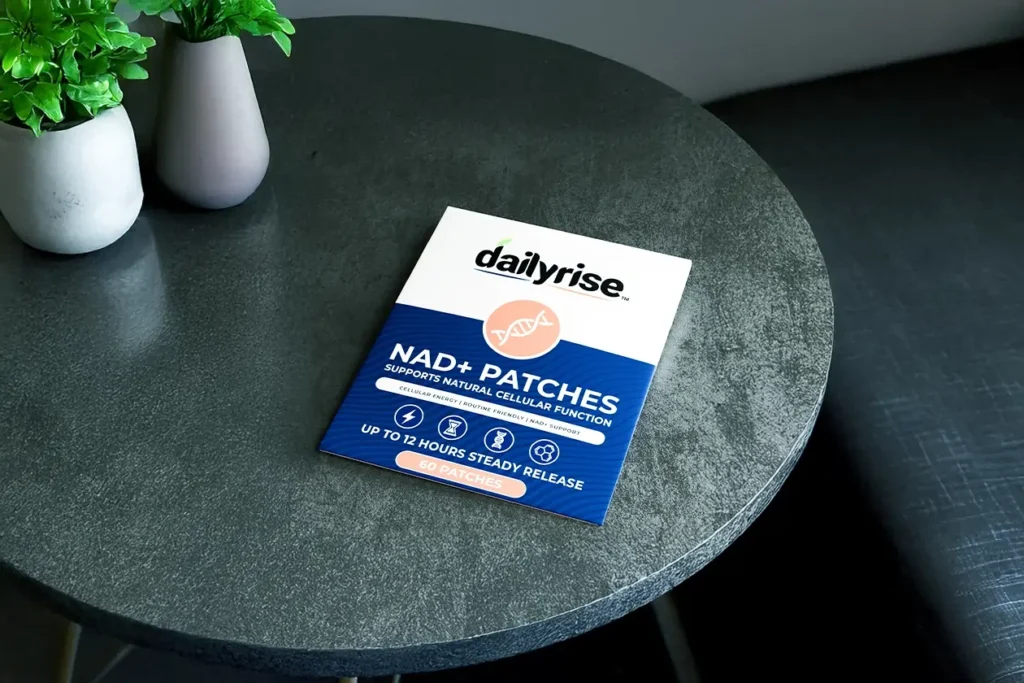
Dailyrise NMN & Resveratrol Patches
Dailyrise’s NMN & Resveratrol patches deliver 600 mg of NMN and 600 mg of resveratrol via a transdermal patch worn for up to 12 hours. The brand states that NMN supports cellular energy and metabolic function, while resveratrol provides antioxidant support and works synergistically with NMN. Directions recommend applying one patch daily to a clean, hair‑free area and wearing it for up to 12 hours. These patches offer a convenient way to supplement NMN without swallowing capsules, but they are not marketed as a solution for grey hair; they are intended to support overall wellness.
Safety and Considerations
NMN appears safe in short‑term trials, but long‑term effects are unknown. Pregnant or breastfeeding individuals and those taking medication should consult a healthcare professional before using NMN or resveratrol patches. DailyRise warns against applying patches to broken or irritated skin and advises discontinuation if irritation occurs. As with any supplement, quality and dosing vary between brands; choose products from trusted manufacturers.
Lifestyle Factors for Healthy Hair
Grey hair is inevitable with age, but you can support hair health through lifestyle choices:
- Balanced diet: Eating a varied diet rich in vitamins B, C, D and minerals (iron, zinc, copper) supports hair structure. NHS guidance highlights that vitamin B12 deficiency is common among older adults.
- Stress management: Chronic stress can contribute to hair loss and possibly accelerate greying via oxidative stress pathways.
- Avoid smoking: Smoking accelerates oxidative damage and is associated with premature greying.
- Protect hair from sun and chemicals: Excess sun exposure and harsh hair treatments can weaken hair and make grey strands appear dull.
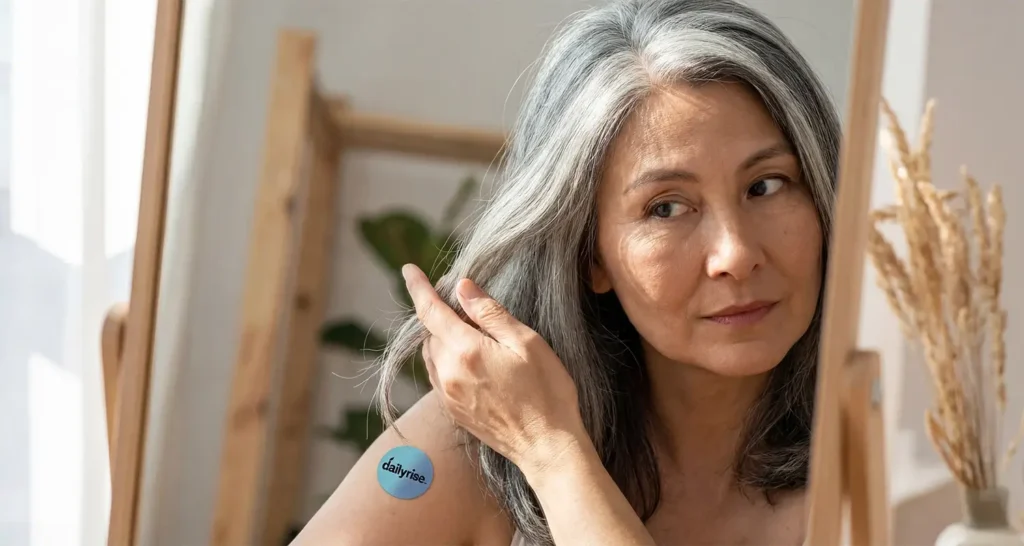
Accepting and Embracing Grey
Grey hair often signifies wisdom and experience. Many people choose to embrace their natural grey and even dye their hair silver for a fashionable look. If you’re bothered by greys, hair dyes remain the most reliable method for changing hair colour. Temporary dyes, semi‑permanent dyes and highlights can camouflage grey hair without permanent commitment.
Medical Evaluation of Early Greying
If you notice rapid or very early greying (before age 20 in Caucasians, 30 in people of African descent), consider consulting a GP. Conditions such as thyroid disorders, vitamin B12 deficiency or pernicious anaemia may underlie premature greying. Correcting these conditions can improve overall health and may slow further greying.
Experimental Treatments and Future Research
Scientists are investigating ways to reactivate melanocytes or introduce pigment cells into hair follicles. Stem cell therapies and gene editing are speculative avenues. At present, there are no approved treatments that can restore natural hair colour once it has turned grey. The best strategy is a healthy lifestyle and acceptance of natural ageing.
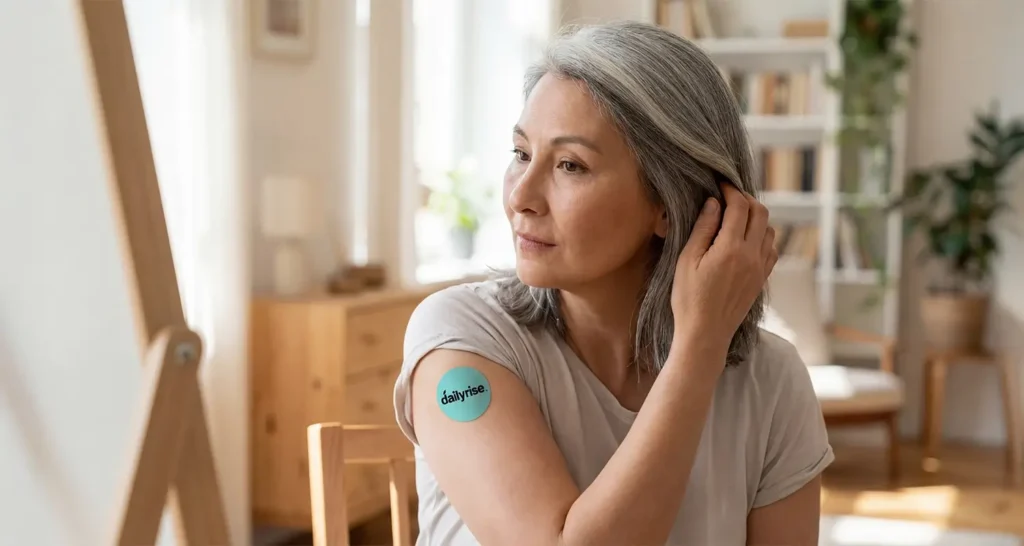
| Approach | What It Is | Evidence for Reversing Grey Hair | Considerations |
|---|---|---|---|
| NMN & Resveratrol Patches | Transdermal patches delivering NMN and resveratrol for 12 hours | No human studies showing reversal of grey hair; some animal evidence for hair growth | Supports cellular energy; consult a doctor if pregnant or on medication |
| Nutrient Supplementation | Vitamins and minerals (B12, iron, copper, zinc) | May correct deficiencies that contribute to hypopigmentation | Test levels before supplementing; deficiency-related grey may not fully reverse |
| Lifestyle Changes | Diet, stress management, smoking cessation | Helps overall hair and health; no direct proof of reversing grey | Benefit extends beyond hair; adopt for general wellbeing |
| Hair Dye | Temporary or permanent colour applied to hair | Reliable way to change hair colour; cosmetic solution | Requires maintenance; some people experience sensitivity or allergies |
| Experimental Therapies | Stem cell or gene therapy | Under research; no approved treatments | Highly speculative; future potential but not available now |
Final Thoughts
Greying hair is a natural and largely irreversible part of ageing. While NMN and resveratrol may offer general health benefits by boosting NAD+ and providing antioxidants, there is no scientific evidence that they can return hair to its original colour. Maintaining a healthy lifestyle, correcting nutrient deficiencies and embracing your natural grey remain the most grounded approaches. If grey hair bothers you aesthetically, cosmetic dyes are the only reliable solution at present.
For tips on restful sleep, check out our post on why does it take me so long to fall asleep on the Dailyrise blog. Explore our range of all patches and Himalayan Shilajit patches to support your wellness journey. If you have any questions, contact us — we’re here to help.






